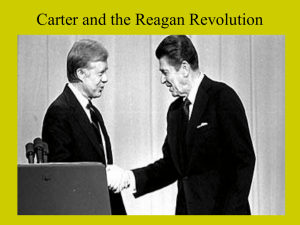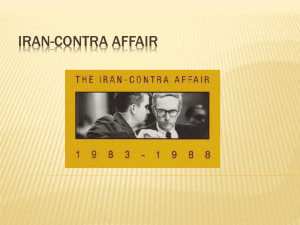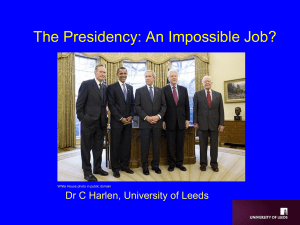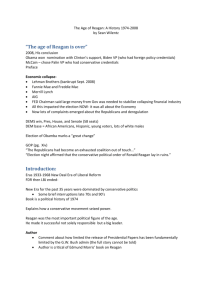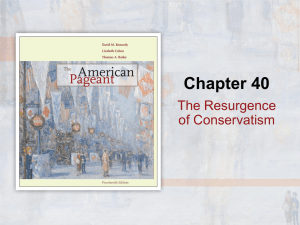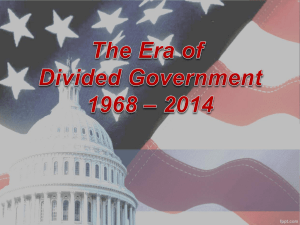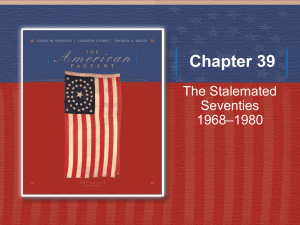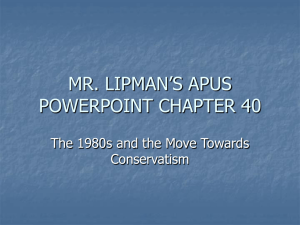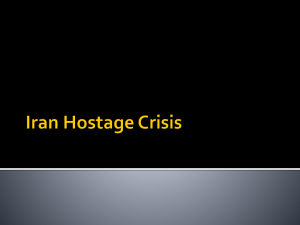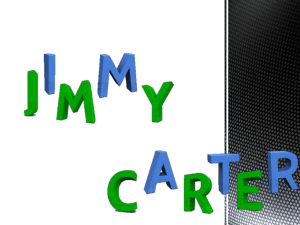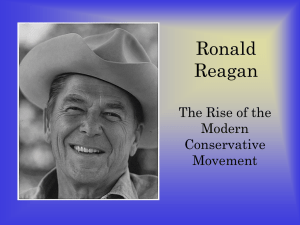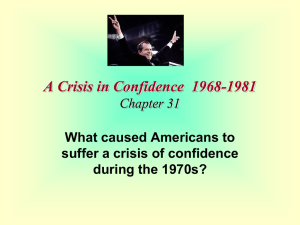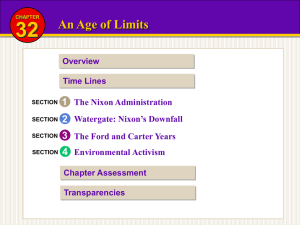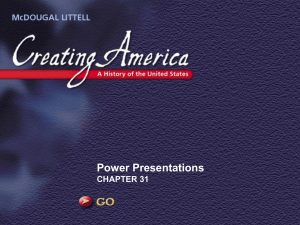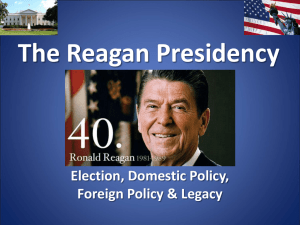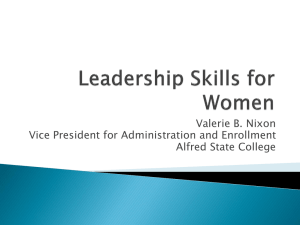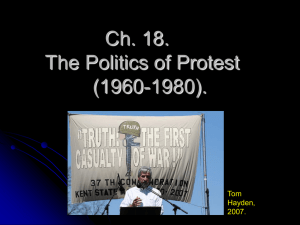America From Nixon to Bush Sr
advertisement
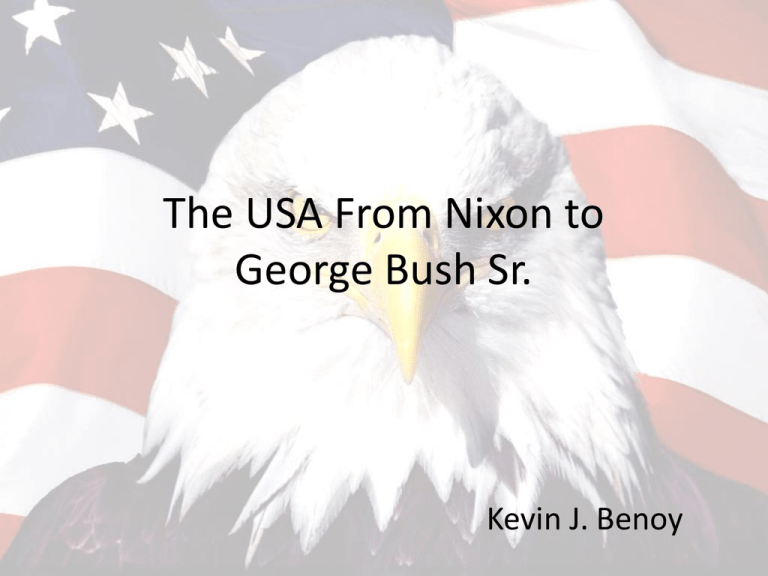
The USA From Nixon to George Bush Sr. Kevin J. Benoy The Nixon Administration • Nixon has been hailed as a genius and condemned as a demon. • Winning in the tumultuous year of radicalism, 1968, he did so on a platform of “law and order.” • His domestic policy was conservative. • In foreign policy he promised an honourable end to the Vietnam War. The Nixon Administration • Richard Nixon was the least idealistic and Wilsonian of America’s presidents since WW2. • He had a strong background of anti-communism from the 1950s. • He helped Chilean General Augusto Pinochet overthrow the democratically elected Socialist government of Salvadore Allende. The Nixon Administration • He was also the President who, through the efforts of his Secretary of State, Henry Kissinger, arranged the American withdrawal from Vietnam. The Nixon Administration • Equally dramatic was his following up Chinese “ping pong diplomacy” overtures with a dramatic visit to Beijing, official recognition of Red China and successful sponsoring of China’s entry to the United Nations and replacement of Taiwan on the Security Council as a permanent member. The Nixon Administration • He also negotiated treaties with the Soviets and ushered in a period of greatly lessened tension in the Cold War – in a policy of detente. • His negotiations with the Chinese and Soviets showed a deft touch as the US played one communist country off against the other. The Nixon Administration • Domestically, Nixon had a less auspicious career. • He seemed to have difficulty distinguishing legitimate dissent from criminal activity. • Nixon labelled most of his opponents – critics, radicals and students – “pinkos.” • During his presidency the shootings of demonstrators at Ohio State University. Economic Trouble • Nixon inherited Johnson’s “guns and butter” difficulties. • Massive US spending weakened the dollar at a time when unemployment rose. • The resulting “stagflation” befuddled economists. • Nixon tried to freeze wages and prices, but the effort failed. • He introduced a 10% tariff on imports but this merely hurt America’s allies and important trade partners. Watergate • Worse still, the President authorized a break-in at the Democratic Party’s headquarters to find out their strategy going into the 1972 election. • When information about the event leaked, he tried initiated a cover-up. Watergate • Evidence of his dirty tricks during the election and transcripts of tapes of private meetings revealed the truth. • The President was foulmouthed, nasty, opportunistic and petty. • Furthermore, he felt himself above the law. Watergate • With the threat of impeachment and criminal charges hanging over him, Nixon made a deal. • He resigned, handed over power to Gerald Ford, his Vice President, who promptly pardoned him for his offenses. Gerald Ford • Ford was, at best, a lame duck President after issuing the pardon. • In two years he had little chance to repair the damage done by his predecessor. The Ford Administration • Ford continued Nixon’s policy of detente and signed the Helsinki Accords, continuing the thaw in the Cold War. • He also presided over a weak economy, the legacy of previous governments. • There was little to commend him when America went to the polls in 1976. Jimmy Carter • Running against Ford was a squeaky-clean Democratic candidate. • Jimmy Carter was a relative unknown, but he was a devout Christian and had a reputation for honesty. • Most importantly for Americans, he had no association whatsoever with the sleazy Nixon administration. • He came across as modest and genuine. The Carter Administration • Economic trouble, the result of years of paying for a war without sacrificing domestic spending, left Carter with a mess. • The American dollar continued to weaken and the balance of payments worsened as interest rates continued to rise, pushing inflation up as unemployment also rose. The Carter Administration • Much inflationary pressure stemmed from rising oil prices as OPEC put political pressure on the US to turn away from wholehearted support of Israel – while also taking a larger return on this valuable resource. The Carter Administration • Carter’s response was to move America to turn to alternative energy sources, to encourage Americans to buy more fuel efficient vehicles and to increase efficiencies. • All of this met with resistance in Congress, so little was accomplished other than reducing speed limits on US roads. Carter and Foreign Policy • Here Carter had great success – and abject failure. • His most notable win was in bringing together Israeli leader Monachem Begin and Egypt’s Anwar Sadat at Camp David – where they signed the first peace treaty between Israel and a neighbouring Arab state. Carter and Foreign Policy • Carter also negotiated an agreement with Panama, committing America to handing back the Panama Canal by the end of the century. Carter and Foreign Policy • Carter was less successful in dealing with the Soviet Union. • Leonid Brezhnev was deeply offended by Carter’s lecturing him on observing human rights after several prominent cases of Soviet dissidents receiving harsh treatment. Carter and Foreign Policy • His biggest failure came in Iran, where America’s client, the Shah of Iran, was toppled by a coalition of middle class reformers and religious fundamentalists led by the Ayatollah Khomeini. • Historically, the CIA trained Iranian secret police, SAVAK, had a notorious record of human rights abuses. Carter no longer looked the other way and called for change. Carter and Iran • A revolution deposed the Shah, who was refused sanctuary in the US. • The revolution was increasingly radicalized, resulting in theocratic government under Khomeini – who referred to the USA as “the Great Satan.” Carter and Iran • After the revolution, armed radical students – with the connivance of the Khomeini regime – stormed the US embassy in Tehran and took the staff hostage. • America appeared helpless. • Military power seemed useless in this situation. • A special forces rescue attempt was launched but it failed miserably. Carter and Iran • Carter’s prestige suffered irreparable damage as a result of the hostage crisis. • 52 Americans were held for 444 days before their release was secured – negotiated by the Carter government but completed by a new President, Ronald Reagan. Was the delay an attempt by the Iranians to annoy a President they hated? Were there dealings with the Republicans to ensure that Carter’s reputation was smeared by the delay? Until Iranian documents are released, we can only guess. Ronald Reagan • Ronald Reagan swept to power in a right-wing backlash against the apparent helplessness of the US in international affairs and domestic financial trouble. • “Yuppies” criticized social spending as the root of American decay. • Reagan promised to end the handouts and make America strong again. Ronald Reagan • Reagan promised to cut taxes by eliminating funding to “welfare bums, black trouble-makers and feminists.” • He promised greater military spending. • Critics labelled his tax cuts and spending increases as “voodoo economics.” Reagan insisted that cuts would pay for themselves and that money would trickle down from corporate profits to all Americans • The American public believed in this congenial ex-actor and Governor of California. • They even elected him to a second term in 1984. Domestic Policy • • • • Tax cuts were introduced at a time when government spending rose enormously. While Reaganomics meant cuts of $110 billion a year on welfare, new weapon systems resulted in the over-all budget increasing by $200 billion a year. At first this put downward pressure on the dollar, but in later years, American overseas borrowing led to an over-priced dollar – making American exports uncompetitive. Under Reagan, America became a debtor nation for the first time since the First World War. Reagan and Foreign Affairs • Reagan began with a black and white view of Soviet American relations, leading to an end to detente and heightened tensions. • Reagan supported any anti-communist regimes, even the most repressive right-wing dictatorships in Central and South America. • His view of the USSR as an “evil empire” convinced him that Soviet influence must be fought anywhere and everywhere. Reagan and Foreign Affairs • His support for the Nicaraguan Contras (anti government forces formed and armed by the CIA) and his invasion of the Caribbean state of Grenada showed his resolve. • In 1986 an air raid on Libya was justified by Libyan activities against Americans later shown to be incorrect. • Reagan was quick to resort to force. Reagan and Foreign Affairs • America led a burst in the arms race which seemed to end any hope of international arms agreements. • His refusal to compromise on his pet project, the Strategic Arms Initiative even placed existing agreements in jeopardy. • The trillion dollar price tag was staggering. Reagan and Foreign Affairs • Fortunately changes in the Soviet Union brought a new and dynamic leader to power – who actively sought better American-Soviet relations despite Reagan’s rhetoric and actions. • A summit meeting at Reykjavik, Iceland met with substantive failure, but began to build a relationship between the leaders. • A later summit meeting in the United states brought a dramatic thaw in cold war antagonism and movement toward an Intermediate Nuclear Forces Treaty. The Reagan Administration • Reagan seemed to emulate Eisenhower in his style of government, delegating responsibility to others and having a hands-off management style. • However, he had difficulty coordinating policy. • Sometimes the US appeared to have two or even three contrary objectives at once. • Secretary of Defense Casper Weinberger and Secretary of State George Shultz were openly hostile to each other. The Reagan Administration • Worse, toward the end of his second term, the activities of Colonel Oliver North and others, which came to light in the so-called Irangate Affair, indicated that his close advisors were pursuing policies directly opposed to Congress – perhaps with Presidential approval. • If he did not know, this was a government that was out of control. It is now understood that Reagan suffered from Alzheimer’s Disease during his second term. It is completely credible that by afternoon he forgot what he was told about in morning briefings. • His continuing funding of the Contras against the wishes of Congress also tarnished his image. The Reagan Administration • In domestic affairs, America found its industries becoming less and less competitive, leading to a demand to drop its centuryold commitment to liberal trade practices – something that Reagan and his successors resisted. Indeed, Reagan entered into negotiations for a free trade deal with Mexico and Canada. George Bush (Senior) • Constitutionally unable to run for a third term in office, Reagan handed over Republican leadership to his Vice President, George Bush, who was duly elected to succeed his popular predecessor. The Bush Administration • Bush inherited huge budget deficits – the logical outcome of Reaganomics. • He was fortunate, however, in getting an unexpected windfall from the collapse of European communism and an end to the Cold War in 1989-1991. The result was an easing of budget pressure in later years. The Bush Administration • The so-called “peace dividend” was harder to take advantage off than realized. • Military spending was a big part of the American economy in many states. Cutting procurement would mean shedding jobs. • Bush’s response was to increase the deficit and leave things alone. • Besides, was the world really a safer place with the Cold War over – or would new threats emerge? Bush Foreign Policy • Opposition to American aims continued in the world, even with the Soviets falling into temporary isolation. • Like Reagan, Bush wanted to wield a big stick – which came down hard on Panama when the US invaded to remove an embarrassing former client. Bush Foreign Policy • When another former client, Iraq, invaded Kuwait, Bush showed himself to be a sophisticate diplomat, bringing together an amazingly disparate alliance of Western countries and Arab nations to pressure and ultimately use force to force Iraq out. He defeated, but did not oust, Saddam Hussein. • As Bush noted, there was now “a new world order.” finis

